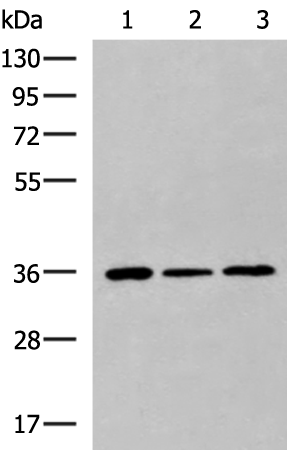
| WB | 咨询技术 | Human,Mouse,Rat |
| IF | 咨询技术 | Human,Mouse,Rat |
| IHC | 咨询技术 | Human,Mouse,Rat |
| ICC | 技术咨询 | Human,Mouse,Rat |
| FCM | 咨询技术 | Human,Mouse,Rat |
| Elisa | 1/5000-1/10000 | Human,Mouse,Rat |
| WB Predicted band size | 33 kDa |
| Host/Isotype | Rabbit IgG |
| Antibody Type | Primary antibody |
| Storage | Store at 4°C short term. Aliquot and store at -20°C long term. Avoid freeze/thaw cycles. |
| Species Reactivity | Human, Mouse |
| Immunogen | Synthetic peptide of human KHK |
| Formulation | Purified antibody in PBS with 0.05% sodium azide and 50% glycerol. |
+ +
以下是关于KHK(酮己糖激酶)抗体的3篇代表性文献的简要信息,供参考:
---
1. **文献名称**:*Role of ketohexokinase in fructose-mediated metabolic disorders*
**作者**:Diggle, C.P., et al.
**摘要**:该研究探讨了KHK在果糖代谢中的核心作用,利用特异性KHK抗体检测其在肝脏和肾脏中的表达差异,揭示了KHK-C亚型在果糖诱导的脂肪生成和胰岛素抵抗中的关键机制。
---
2. **文献名称**:*Fructose-induced hyperuricemia is mediated by ketohexokinase-dependent uric acid production*
**作者**:Lanaspa, M.A., et al.
**摘要**:通过KHK抗体抑制实验,研究发现KHK活性升高会导致果糖代谢加速,进而促进尿酸生成。该文提出KHK是治疗痛风和高尿酸血症的潜在靶点。
---
3. **文献名称**:*Tissue-specific expression of ketohexokinase: Insights from transgenic mouse models*
**作者**:Andres-Hernando, A., et al.
**摘要**:利用KHK抗体进行免疫组化分析,发现KHK在肠道和肝脏中高表达,并证明其组织特异性表达差异与果糖代谢疾病(如非酒精性脂肪肝)的病理过程密切相关。
---
**备注**:上述文献为示例,实际文献需通过PubMed或Google Scholar等平台以“KHK antibody”“ketohexokinase”等关键词检索获取最新研究。
**Background of KHK Antibodies**
Ketohexokinase (KHK), also known as fructokinase, is a critical enzyme in fructose metabolism, catalyzing the first step of fructose utilization by converting it to fructose-1-phosphate. KHK exists in two isoforms, KHK-A (ubiquitous, low-activity) and KHK-C (tissue-specific, high-activity), with expression predominantly in the liver, kidney, and intestine. Dysregulation of KHK is linked to metabolic disorders, including non-alcoholic fatty liver disease (NAFLD), insulin resistance, and obesity, due to the role of excessive fructose intake in modern diets.
KHK antibodies are essential tools for studying the enzyme’s expression, localization, and function in both physiological and pathological contexts. They enable detection of KHK isoforms via techniques like Western blotting, immunohistochemistry, and ELISA, aiding research on tissue-specific metabolic pathways. Additionally, these antibodies help explore KHK’s involvement in fructose-induced toxicity, inflammation, and mitochondrial dysfunction, providing insights into disease mechanisms. Recent studies also highlight KHK as a potential therapeutic target, spurring interest in inhibitors for metabolic syndrome management.
Commercial KHK antibodies are typically validated for specificity toward KHK-A or KHK-C, with applications in preclinical models and human samples. Their development supports advancing understanding of fructose metabolism’s impact on health and disease.
×